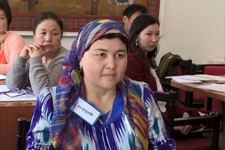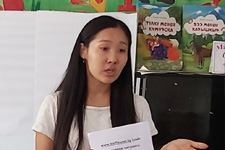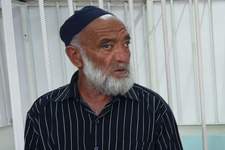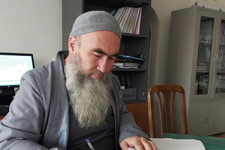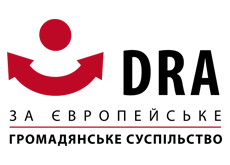Situation on human rights for freedom of association and the use of prosecutions against human rights defenders - Human Dimension Implementation Meeting - OSCE ODIHR – 2016
Human Rights Movement "Bir Duino Kyrgyzstan" notes that during 25 years of independence, citizens' rights guaranteed by the Constitution are systematically usurped and subjected to violations, and the state, being a guarantor is not responsible and does not fulfil its obligations to protect the rights of its citizens. Over the past three years, Kyrgyz parliamentarians and the government initiated number of legislative initiatives aimed at narrowing the political space of civil society. Many of these initiatives are dictated by the process of rapprochement with Russia, integration processes joining the Customs Union and the EAEC in connection with what copying of Russian legislation aimed at suppressing civil society and harassment of human rights defenders.
The use of the hate speech against the non-governmental organizations has intensified significantly in recent years. According to the conclusion of the "School of Peace Making and Media Technology" "in 4% of cases LGBT has been a target of hatred for the reporting period, 2.4% and 2.3% of hostile messages was aimed at the U.S. and local NGOs, respectively” in the media field[1].
Kyrgyzstan is not fulfilling its obligations relating the human rights having ratified most part of the UN Convention and the Optional Protocols. Out of 664 recommendations voiced by UN treaty bodies in relation to Kyrgyzstan, including the necessary protection of human rights defenders, none of them has been implemented[2]. Reduced funding and withdrawal of donor organizations in Kyrgyzstan also affect the activities of civil society organizations, and especially in the regions of the country. The adopted EU Strategy for Central Asia, tens of millions of Euros provided by the European Union to the Government of the Kyrgyz Republic to finance "priority actions"[3] put in unequal conditions the non-governmental organizations and the public sector in the Kyrgyz Republic.
Issuance for public discussion of the bill "On the appointment of the referendum on the Law of the Kyrgyz Republic", “On Amendments to the Constitution of the Kyrgyz Republic" in July 2016 became another serious challenge for civil society. Amendments to the Constitution suggest the abolition of the primacy of international law over domestic and some rules lead to a partial strengthening of the executive branch of government, in particular of the position of the Prime Minister, substantially reduce the effectiveness of the constitutional control of putting the judicial authority in the role of a statistician, hardly able to make their own decisions about unconstitutionality of the laws[4]. Thus, the referendum and the possible adoption of the constitutional amendments will entail negative consequences, and retreat from the principles of human rights and democratic values.
Restrictions on the right to freedom of association
Numerous attempts were made in Kyrgyzstan since 2012, to restrict the political rights - the right to freedom of association at the legislative level by initiating laws that are discriminative, especially in relation to NGOs.
The results of interviews with NGO leaders held by Public Association "Bir Duino Kyrgyzstan"[5] revealed that:
• The recent increase in cases of unjustified interference and pressure from the state and / or national-patriotic radical movements on human rights organizations and their employees, as well as members of the LGBT communities and organizations involved in the protection of LGBT rights;
• There is a negative public discourse ("hate speech") in respect to NGOs receiving foreign funding, and associations defending the rights of minorities (notably LGBT) people in the media and society. Such public discourse (the so-called "defamation" of human rights defenders, the growth of xenophobic attitudes, creating a negative image of NGOs), mostly manifested after the initiation of legislation on NGOs as foreign agents and "on the formation of positive attitudes towards non-traditional sexual relations", puts pressure on NGOs and creates obstacles to form broad public support for NGOs' activities;
• To some extent experienced unjustified interference and / or pressure from the organization of the state, dealing with the protection of the rights and promotion of civil interests (advocacy), increasing the transparency and accountability of public authorities;
• The fact of the situation when the state or local governments do not provide assistance or do not create the conditions for civil society organizations (one out of four according to the survey results) is still quite frequent.
Results of the analyses of statistical data received from the Ministry of Justice and its regional departments, from the short survey about the procedures of registration among the NGOs and interview with the expert organizations indicated that there are some issues in practice, foremost linked to the quality of the provided services, more specifically:
• Lack of information and consultation of citizens for unhindered registration procedures of NGOs;
• Lack of online application procedures;
• Non-unified provision of services by all departments of justice;
• There is a possibility of the existence of an artificial complicating and delaying of the registration process, and therefore the possibility of corruption;
• Failure to provide information on the number of inquiries for registration and re-registration of NGOs individual Departments of Justice (in particular, the Chui-Bishkek Department of Justice) within three months the study shows not only a violation of the legislation on access to information, but also that these data are properly reviewed not collected and analysed by the department;
• Lack of simplified re-registration procedure in the case of the adoption of the guidance solutions legal entity (NGO) to re-register to another legal form of organization.[6]
Billon «Foreign agents»
Over the past three years, Kyrgyz parliamentarians and the government initiated number of legislative initiatives aimed at narrowing the political space of civil society. Many of these initiatives are dictated by the process of rapprochement with Russia, integration processes joining the Customs Union and the Eurasian Economic Community in connection with what the copying of Russian legislation aimed at suppressing civil society and harassment of human rights defenders is taking place.
One of such initiatives was the bill on Amendments and Additions to the Law "On Non-commercial Organizations" (On foreign Agents). The bill was registered in the Parliament in May 26, 2014. 65 parliamentarians voted against in the third reading, thus rejecting the bill on May 12, 2016.
The original version of the bill is supposed to give non-profit organizations that receive funds from abroad and engaged in political activities, the status of "foreign agent." Such organizations were supposed to report not only to the State Revenue Service and the Social Fund, but to the Ministry of Justice as well.
The Bureau of OSCE on democratic institutes and human rights gave a negative assessment of the law. It was stated that the law contradicts the international standards in the sphere of the rights to associations, to the norms of the Constitution and international obligations of the Kyrgyz Republic. Moreover the negative assessment was given by the Ministry of Justice of Kyrgyz Republic and number of public discussions on the bill were held involving wide circle of civil society representatives.
This law was adopted in the first reading on July 4, 2015 regardless of the expert’s conclusions. Later the bill was directed to Committee on Human Rights, Constitutional Legislature and State Order which has changed the content of the bill after the discussion with the civil society. It took away some discriminative norms and the term “foreign agent” although two articles remained:
One article was regarding the foreign noncommercial organizations and structural departments. Amendments considering possibility of implementation of the work of foreign noncommercial organization on the territory of Kyrgyz Republic through its branches and departments puts them into dependency from the state register machine and creates barriers on the way of free implementation of its work and is counted to be discriminatory.
Another article was about accountability. It contained information on the sources of financing and the property of the organization, information about the bodies of management and number of staff, information about use of property and financial resources of organization that has to be published on the official web-site of the organization or on the official web-site of responsible organization in the sphere of registration of legal entities, branches no later than April 1st of the year following the reporting period.
These amendments are not in compliance with the democratic standards of NGO’s work regulation and could sufficiently worsen the legal status of NGOs in Kyrgyzstan. In democratic states 1) the requirements on publication of the reports can be set only for those NGOs that additionally have the status of charity or of the publicly useful organization since presence of such status gives a right to certain privileges including the tax preferences, 2) the work of the rest of NGOs is regulated similar to the regulation of the work of noncommercial organizations.
The new edition of the bill makes it obligatory for the NGOs to publish their financial reports on yearly basis while the similar requirement is not used simultaneously to the commercial organizations. It is a mistake to consider the NGO as a special source of national security taking into account the fact that during the whole period of Kyrgyzstan’s independence there were no cases of using NGOs to the detriment of Kyrgyzstan[7].This version of the bill passed the second reading and was declined during the third reading on May 12, 2016. Although parliamentarians can initiate its consideration again after six months from the last voting.
Restriction of rights to the freedom of association of religious organizations
The right to the freedom of association of religious organizations is substantially limited by setting complicated conditions of their registration. In the national legislature of Kyrgyz Republic as well as in law enforcement practice on the freedom of religion and beliefs, regardless of the norms of the Constitution defining that «each has a right to freedom of conscience», is considered not as individual but as collective right as a right to create religious associations and to work in religious sphere.
Setting required registration of religious associations and prohibition to one or group of persons to use to its fullest potential the freedom of conscience and religion does not follow the legitimate goals and is not necessary in a democratic society and isn’t in accordance with these aims. Setting strict qualitative requirements for setting religious associations -200 persons for registration of religious organization in KR and the geographic limitation of religious associations cannot be justified.
The situation with human right defenders and legal prosecutions
The prosecution of human rights defending organizations and defenders actively involved into protection of civil and political rights of citizens, national minorities, religious people and LGBT groups has been activated in recent years.
Human rights defending non-governmental organizations are the most vulnerable in terms of physical immunity.Exactly the human rights defenders are the particular group of public activists whose freedom of work is a direct indicator of the general level of compliance of human rights in the country. Most often the human right defenders and civil activists including LGBT communities receive threats directed on threatening, intimidation, and termination of human right defending activity.
Such vulnerability of NGOs dealing with human rights and promotion of civil interests, gender issues and advocacy, is revealed first of all by government using antiterrorist bill and tools of impact of state power for limitation of “political” work of NGOs which is followed by the pressure on NGO leaders as well as on the members of their families[8].
Some human right defenders had to leave the country during different periods. Such as Tolekan Ismailova with her family, Dmitri Kabak, Vitali Kachergin the journalist[9]. Authorities were prohibiting to some staff of international organizations and experts to enter Kyrgyzstan. Last case is linked to the denial to Mihra Rittman, the Director of Human Rights Watch in Bishkek while she was entering the country[10].
The persecution of «Advocacy center on human rights»
The State Committee on National Security (SCNC) has initiated the criminal case regarding the Advocacy center on human rights that was implementing its work in cooperation with Freedom House. The goal of the project is monitoring of implementation of civil rights of national minorities of Batken and Jalal-Abad oblasts.
On 26.09.2014 the investigator of SCNS for Osh and Osh region A. Dzhenbaev under the pretext that on 20.09.2014 the collective and individual inquiries were received from Osh residents to take action on the fact of illegal activities of representative offices of international organizations in Osh, particularly of "Freedom House" and USAID. On 26.09.2014 the decision on issuing a criminal case was made, (the criminal case №082-14-02100) on the grounds of crime under Art. 28 - 299 Part 1 of the Criminal Code of the Kyrgyz Republic. The rationale in the decision to initiate criminal proceedings stated conclusion of philological, political science expertise of the National Academy of Sciences of the Kyrgyz Republic №40 / 01-143 from 25.09.2014, according to which certain issues in a hidden and an implicit form are actions aimed to incite ethnic hatred, which may, under certain circumstances trigger riots on the basis of international relations.
The criminal investigation against the Advocacy center was conducted against the backdrop of the active involvement of the Kyrgyz Republic in the Eurasian integration processes. Kyrgyzstan also copies Russian in terms of social and political issues lately.
The permission for the search was issued for "Bir Duino Osh" office and staff in March 2015. Investigators and intelligence agencies of Osh and Osh Oblast SCNS seized more than 100 criminal cases of June tragedy victims, the case of Askarov, victims of torture and injustice.
Restriction of activity, persecution of human rights defenders and lawyers, searches of the Osh BDK office
March 27, 2015. SNSC conducted illegal searches in the office of the Osh branch of the human rights association "Bir Duino Kyrgyzstan" (BDK), as well as in the houses of Valerian Vakhitov and Husanbai Saliev, the lawyers. These actions of SNSC is consider by lawyers and human rights defenders as a direct pressure on independent lawyers and human rights activists from the national security agencies.
The reason for the searches were the unjust decisions of the judges of Osh Kadyrbek Matisakov and Bolot Satybaldiyev from March 26 and 27th. The sanctions indicate withdrawal of banned extremist materials. The sanctions for warrant were issued on a criminal case brought not against these lawyers, but in respect of a foreign citizen Umar Farouk. According to recent data Osh City Court held a trial of an American journalist Umar Farooq in the afternoon of March 28. In accordance with the decision of the Court there were no sufficient data for criminal prosecution in the actions of Umar Farouk, and therefore the decision was made to deport a journalist from the country.
However, according to Art. 13 of the Law of Kyrgyz Republic "On Countering Extremist Activity" information materials recognized as extremist by a court decision on the proposal of the prosecutor's office, and then forwarded to the judicial authorities to compile a list of extremist materials and informing the public about it.
In accordance with Part 5 of Article 29 of the Law "On the Bar and Advocacy of the Kyrgyz Republic "requisitioning, seizure, examination, inspection, copying of documents, collection and use of information relating to legal aid for a particular criminal case, shall be permitted only in the case of involvement of a lawyer as the accused .... " Under Part 3 of the same article, the criminal case against an attorney in connection with his professional activities can be initiated only by the Prosecutor General of the Kyrgyz Republic or his deputy.
No charges were filed and the criminal proceedings against the lawyers Vakhitov and Saliev have not been initiated. Thus, the judges of the Osh City Court and the staff of the National Security Committee violated the principles of independence, integrity of advocacy and lawyers immunity. Legal sanctions are issued without the involvement of prosecutors in violation of Article 8 of the Code of Criminal Procedure.
The search lasted for 4 hours. The laptops, flash cards were seized, recorders, drives, and other materials were taken away. Vahitov and Saliev are known for their active advocacy work. As attorneys, they protect the interests of citizens at the national and international levels in cases involving torture, extortion, religious and ethnic issues.
The confiscated materials related to the criminal cases of human rights defender Azimzhan Askarov; Karasu imam Kamalov Rashod; rape of a 9-year-old boy by the moldo of madrassa; Rahmanzhan kyzy Burulai who is in detention with 3-month-old baby; Dzhumabaev Dilorzhon, beaten during the search of SCNS employees; Baybabaev’s family who are entrepreneurs and from whom SCNS employees extorted 20 thousand dollars; Abidjanov Khakimzhan and his elderly father, who was beaten during the search of SCNS employees
In the case of Abidjanov in regard to the SCNS investigator Arthur Shadybekov a special ruling of the court was issued for violation of the law during the investigation of this criminal case. The same investigator conducted a search in the house of the lawyer H. Saliev. The criminal case against employees of Advocacy Centre for Human Rights, which were being defended by lawyers V.Vahitov and H. Saliev, were dismissed by the prosecutor's office of Osh region, and in relation to the investigator Almanbet Dzhenbaeva the decision of bringing him to justice was taken.
On April 30, 2015 Osh Regional Court overturned all three decisions of the Osh City Court, according to which the National Security Committee officers carried out searches in the office of the human rights organization "Bir Duino" and the houses of lawyers. All proceedings related to seizure, inspection affairs and actions of investigators were found illegal.
June 24, 2015 the Supreme Court ruled the searches in the Osh office of "Bir Duino Kyrgyzstan" and house of lawyer Valerian Vakhitov as illegal.
The above judicial acts of the Osh Regional Court and the Supreme Court of the Kyrgyz Republic categorically given a legal assessment of the actions of A.Dzhenbaev and A.Shadybekov investigators of SCNS for Osh city and Osh oblast and rulings of judges of the Osh City Court on March 26 and March 27, 2015 by Matisakov and Satybaldiyev - as unlawful. The decision of Supreme Court of the Kyrgyz Republic is final and not appealable.
The indicated officials not only didn’t carry responsibility for their illegal actions, but still occupy important positions in the law enforcement and judicial bodies of the state. Repeated complaints to the General Prosecutor's Office and the prosecutor's office of Osh region were in vain.
The claims on committed crimes against lawyers were sent to prosecuting authorities repeatedly (obstructing advocacy, abuse, abuse of power, etc.). To this day decision has not been made, even though, according to Art. 156 of the Criminal Procedure Code of the Kyrgyz Republic, according to reports of crimes committed by the decision shall be made within three days, and in exceptional cases, this period does not exceed 10 days[11].
Limitation of access to justice of Azimjan Askarov, defender
Over six years, the victims of ethnic conflict in southern Kyrgyzstan are awaiting for justice. A well known human rights activist, a victim of torture and discrimination human rights defender Askarov is waiting for freedom and justice against today in colony 47. The case of Askarov, of a prominent human rights activist, who has lost his freedom for his human rights activities, is known all over the world. Askarov is very ill and his health has worsened. He suffers from the psychological torture because of his deprivation of access to fair justice.
His lawyers have passed all authorities for protection of his constitutional rights and freedoms during six years. The UN Human Rights Committee called on Kyrgyzstan to release Azimzhan Askarov and annul the decision to recognize him guilty on April 21, 2016. In accordance with the decision A.Askarov was detained illegally, kept in inhumane conditions, was subjected to ill-treatment and was denied the opportunity to properly prepare for the defense in the trial. The Committee, which is composed of 18 independent human rights experts, found that in the process of dealing with Askarov Kyrgyzstan violated several articles of the Covenant on Civil and Political Rights, the State party of which it is. "The results of forensic medical examination, carried out by independent experts, along with other evidence indicate that Askarov was subjected to torture"[12].
On April 25 press service of the Supreme Court of Kyrgyzstan issued a statement stating that the Supreme Court is ready to re-examine the case of Azimzhan Askarov, so today the senior management of the country has a historic opportunity to correct the mistakes of five years of discrimination and human rights activist A.Askarov and limitation of his access to justice.
The process for consideration of the case of Azimzhan Askarov on new circumstances in accordance with the views of the UN Committee on Human Rights of March 31, 2016 at the Supreme Court of the Kyrgyz Republic was completed on July 12, 2016.
As the Committee noted "the facts reveal a violation of article 7 of the authors rights, separately and in conjunction with article 2, paragraph 3; Article 9, paragraph 1; Article 10, paragraph 1 and article 14, paragraph 3 (b) and (e) of the Covenant. "
The UN Committee on Human Rights urged the Kyrgyz authorities to immediately release from prison human rights activist Azimzhan Askarov in a press release issued on the case.
The definition of the Supreme Court of July 12, 2016 the case was sent for retrial in Chui Oblast Court and Askarov was not released from prison.
Public Association “Bir Duino Kyrgyzstan” is disappointed by the solution of the Supreme Court and considers that the State failed to comply with the obligations taken up in accordance with paragraph 4 of article 5 of the Optional Protocol to the International Covenant on Civil and Political Rights as well as Article 41 requirements of Part 2 of the Constitution of the Kyrgyz Republic, which determines that in case of human rights and freedoms of a violation by international bodies, the Kyrgyz Republic is taking steps to restore them.
The Supreme Court questioned the validity of the decision of the UN Human Rights Committee, which had been ascertained in the presence of the court verdict in the case of civil and political rights violations Azimzhan Askarov International Covenant, thereby showing disrespect for the universally recognized principles of international law.
The trial over the objections of the lawyers did not consider the new circumstances marked by the Committee the story of the criminal case was studied in violation of Article 389 of the Criminal Procedure Code of the Kyrgyz Republic, which found that the decision of the court is brought to the consideration of new circumstances.
While commenting on the verdict prosecutors in the trial noted that the rule of law was provided during previous processes, and they were within the requirements of the Criminal Procedure Code of the Kyrgyz Republic.
However, those who were present in the hall of the Supreme Court on July 12, 2016 were convinced once again that the trial took place in the same way as it was in the courts of first and second instance of Jalal-Abad region, with rudest violations of procedural norms. The life of Askarov’s lawyers, public defender Ismailova and human rights activist Aziza Abdirasulova and their relatives were under the constant threat.
The next trial in Chui Oblast Court was appointed to September 22, then moved to October 4, 2016 and will be held in the building of the Judicial Department convoy.
PA "Bir Duino Kyrgyzstan" calls on government authorities to implement considerations adopted by the UN Committee for Human Rights in the case of Azimzhan Askarov, to confirm the effectiveness of the reform of the judiciary declared by the President of the Kyrgyz Republic Atambaev and the authorities, and to ensure compliance with the procedural requirements of litigation proceedings, which will lay the trust of citizens to build a free and democratic state, based on respect for and protection of human rights[13].
Attempts to confiscate Askarov’s property
Public Association "Bir Duino Kyrgyzstan" protects the property rights of Azimzhan Askarov’s spouse, in connection with the intention of the Fund of the State Property Management under the KR Government to confiscate property of Azimzhan Askarov.
According to the Fund of State Property Management under the Government of the Kyrgyz Republic letter was received from division of bailiffs service of Bazar-Korgon district on the confiscation of property of the convicted Askarov Azimjon. According to which, in accordance with the verdict of Bazar-Korgon District Court of Jalal-Abad region, and on the basis of a writ of execution, property A.Askarova should become the property of the state on May 23, 2012.The Fund held an inventory of property A.Askarova on May 25, 2016.
The lawyers of "Bir Duino Kyrgyzstan" claim that Criminal code provides a list of property that cannot be confiscated and it includes a house or an apartment, where the convicted person or his family live. Therefore confiscation of house is illegal, because Askarov's family resides there and it is the only house Askarovs possess and it cannot be subject to confiscation[14].
In connection with the existing rude violations of the rule of law in confiscation of Askarov’s property, Director of "Bir Duino-Kyrgyzstan" Human Rights Centre (BDK) Ismailova lodged a complaint to the main supervisory body of the Country. BDK considers the actions of the authorities of Bazar-Korgon district and the State Property Fund (SPF), as an action of Askarov's family intimidation[15]. The trial on the property of A.Askarova is appointed to September 13, 2016.
Defamation of T.Ismailova and A.Abdirasulova, the defenders
Defamation of T.Ismailova and A.Abdirasulova, the defenders by the President of KR Atambayev blaming them for "working for foreign grants" and links to opposition groups during the ceremony of awarding the mothers of many children with orders "Baatyr ene" on Mother's Day, May 14th, 2016.
On May 14, 2016 at the awards ceremony of women with many children President Almazbek Atambayev while listing his enemies in his speech, to whom he attributed the leaders of so called "People's Parliament" among them he named the Head of the human rights movement "Bir Duino Kyrgyzstan" Tolekan Ismailova and Head of the Public Fund "Kylym Shamy "Aziza Abdirasulova accusing human rights defenders in the destabilization of states, presenting them to the public as people who are "faithfully working for foreign grants". Reputational damage that was done to human rights defenders, has been particularly strong since the president's speech was delivered at the award ceremony of women with many children on the occasion of Mother's Day.
A protest was held during which human rights defenders have demanded an apology or proof of guilt from the head of state on May 16. On May 18 the Pervomai District Court received petitions from Tolekan Ismailova and Aziza Abdirasulova, human rights defenders demanding from Almazbek Atambayev, the President of Kyrgyzstan compensation of moral damages in sum of four million soms. As a result the Pervomai District Court issued a decision not in favor of Tolekan Ismailova, the Chairman of the public association "Bir Duino Kyrgyzstan" and Aziza Abdirasulova, Executive Director of the human rights "Kylym Shamy". The Court rejected the claims of human rights defenders.
Bishkek City Court rejected the claim of Tolekan Ismailova and Aziza Abdirasulova, human rights defenders to Almazbek Atambayev, the President of Kyrgyzstan on September 7, 2016. Human rights defenders are intended to appeal to the Supreme Court in order to challenge the decisions of the second instance.
Network of human rights defenders in Kyrgyzstan
From July 25 to August 9 ,2016г. «Bir Duino Kyrgyzstan» during the regional meetings with partners held discussions and analyses of situation on the rights of defenders in regions from July 25 to August 9, 2016[16].
Main threats and challenges in the work of civil society activists in 7 regions of Kyrgyzstan
The negative impact on the perception of human rights in society. Active promotion by Parliament of the bills aimed at restricting the freedom of non-governmental organizations, in particular the draft law "On foreign agents" and efforts in this regard, the negative propaganda in the media in relation to non-governmental organizations, human rights defenders had the strongest negative effect on the image of human rights defenders and NGOs during past three years. In this situation, the Ombudsman Institute had a negative impact and contributed to the preservation of freedom of association and political space of NGOs in Kyrgyzstan.
These processes have led to a misunderstanding of the role of human rights defenders in society, strengthened the confidence of the population and as a result they are discredited, they are subject to discrimination, intimidation, defamation.
The pressure of public bodies on human rights defenders. At the meetings in seven oblasts human rights activists reported that the most frequent problems faced by human rights defenders in all areas - is the lack of support, discrimination, pressure and harassment by state agencies, law enforcement, national security, as well as local administrations and akimiats. Auditing by the fiscal authorities, the threat of closure of organizations, opening of criminal cases were also mentioned. In the southern areas participants of the meeting told about possible threats, searches of offices, arbitrary arrests and invitations to law enforcement agencies, constant monitoring of cell phones.
Threats and pressure on human rights defenders. According to human rights defenders there are activists and human rights defenders in each region who were subjected to psychological pressure, threats of physical violence, both personally and with regard to their families and children because of the work they are engaged in. In this regard local law enforcement agencies play a very passive role not contributing to their protection. It is very difficult to conduct human rights activities in connection with the tribalism, cronyism and nepotism present in the Kyrgyz society.
Issues
Insufficient knowledge and lack of databases of human rights defenders. One of the main shortcomings or weaknesses of human rights defenders in the regions is the lack of or insufficient number of legal professionals, human rights defenders themselves and civil society activists do not always have enough luggage of legal knowledge to provide professional protection for victims. In this regard, the absence of a specialized database of human rights defenders, poor communication between partners and systems of redirection between human rights organizations have a negative impact on the work and usually a small number of successful cases affect the credibility and perception of human rights by public authorities and the public.
Limited resources. Human rights defenders and activists in regions of Kyrgyzstan noted that the weakening of the human rights movement has been affected by financial instability, the reduction of resources and donor assistance to support the capacities of regional organizations and their ability to actively work. Weak technical base, lack of coordination centers for human rights defenders affect the fragmentation of their activities.
Lack of knowledge on provision of security. The meeting participants believe that engaging in human rights activities is adversely affected by the lack of knowledge on the safety of human rights defenders from the arbitrariness of the authorities, the lack of rapid response teams, technical means of protection, lack of temporary shelters and information about the mechanisms of international protection.
Creation of network of human rights defenders
Members of the Strategic Planning meeting pointed out the need to establish active national network for the protection of human rights defenders with a large coverage of human rights defenders and strong database for joint advocacy companies and expanding partnerships, rapid response in cases of harassment and pressure to colleagues in order to solve the problems and challenges in the work of human rights defenders.
Therefore, according to the meetings results 72 participants signed a Memorandum of entry into the network for the Protection of Human Rights Defenders. Strategic plan for its work for the period of 2016 – 2019 has been developed[17].
Recommendations to Jogorku Kenesh of KR and the Government of KR:
On the issues of citizen’s protection on freedom of association
- To the government officials and politicians to be guided by the recommendations of the Venice Commission and to stop lobbying amending the Constitution[18];
- To refuse the promotion and adoption of unconstitutional laws aimed at restricting basic civil and political rights, including freedom of association and peaceful assembly;
- To accelerate the implementation of 664 recommendations of the UN agencies in the field of human rights addressed to Kyrgyzstan, making them central to the realization of all state bodies and institutions.
- To the state and local authorities to create favorable conditions for the work of NGOs in accordance with the principle 2 (the State's obligation to respect, protect and promote the right to freedom of association) and other principles laid down guiding principles on the freedom of associations of OSCE / ODIHR;
- To cancel the compulsory registration of religious groups and to ensure that legislation concerning the registration guarantees human rights to ensure the free practice of religion and religious beliefs, including creation of formal organizations. To exclude various territorial statuses for religious and public associations since as the violation of international guarantees of the right to freedom of association;
- To envisage in the Law "On state registration of legal entities, branches (representations)" a provision on granting the applicant a reasonable time to correct the identified technical inaccuracies excluded from the list of grounds for refusal of registration " detection of inaccuracies or any inconsistencies in the information contained in the documents";
- To end the excessive control and undue interference in the activities of NGOs, as well as the intimidation and harassment of individuals and groups that deal with human rights;
- To refrain from political initiatives and rhetoric discrediting NGOs and human rights defenders, and not to perceive NGOs (local or international) as a source of threat to stability and security. Instead, they should publicly recognize the importance of NGO efforts to promote human rights, to condemn the attacks on NGOs and their members, to support the participation of NGOs in decision-making at all levels, and to cooperate with NGOs to improve the situation with human rights protection at the level of legislation and practice.
- To the Ministry of Justice to develop and implement service standards in the field of NGO registration, to provide ready-made templates in Russian and Kyrgyz languages;
- To create conditions for the organization of electronic registration (submission of documents, expert advice online, etc.);
- To pay attention to the "hate speech", a widely used in media, TV, radio of KR against NGOs, human rights organizations and human rights defenders.
Recommendations on defense and provision of rights of defenders:
- To develop and implement a mechanism of protection of human rights defenders, including a mechanism for monitoring the implementation of rights pursuant to adopted UN General Assembly Resolution on the Protection of human rights defenders (Kyrgyzstan voted for the adoption of this resolution), and in accordance with the Guidelines on Human Rights Defenders BDIP / OSCE;
- To ensure compliance of domestic legislation with the provisions of the UN Declaration on Human Rights Defenders, the Guidelines on the Protection of the ODIHR / OSCE human rights, paying special attention to the exclusion of legal obstacles to obtaining financial resources, their independence, freedom of association, of assembly and freedom of expression;
- To ensure that the human rights organizations, activists and lawyers could carry out their work without hindrance and fear; properly investigate all cases of persecution and bring the perpetrators to justice, and to release all human rights defenders detained for their activities;
- To stop impeding an open public debate on matters of public interest such as respect for human rights by blocking the work of civil society organizations, independent Web sites, using defamation suits or other legal proceedings as a means to silence critics;
- To abandon the practice of the use of prosecutions against human rights defenders and human rights organizations, due to their human rights activities.
Recommendations for Azimzhan Askarov, the defender:
- o To enforce the decisions of the UN Committee on Human Rights on production of a new trial in Chui Oblast Court. Thus, the case was redirected to Azimzhan Askarov;
- o To provide access to a fair trial and to justice for the human rights activist Azimzhan Askarov when considering a new trial in the Chui regional court and on confiscation of A.Askarov ‘s family property;
- o To ensure access to quality health care for the human rights activist Azimzhan Askarov, located in the colony №47.
Threats to attorneys:
- To implement the legislative acts of the Kyrgyz Republic the norm, according to which any criminal effect against lawyers, including criminal prosecution should take place after the official consent of Council of the Bar of the Kyrgyz Republic's;
- To provided toughened punishment for obstruction of lawyer activity.
Human Rights Movement "Bir Duino-Kyrgyzstan"
tel.: +996 312 38 33 30, fax. +996 312 38 33 30
Email: birduinokyrgyzstan@gmail.com
[1] http://ca-mediators.net/ru/issledovaniya/216-rezyume-issledovaniya-yazyk-vrazhdy-v-smi-internete-i-publichnom-diskurse-2015.html
[2] https://www.fidh.org/IMG/pdf/kyrgyzstanobsrusse2016web-2.pdf
[3] http://kyrtag.kg/economy/es-vydelyaet-kyrgyzstanu-vtoroy-transh-makrofinansovoy-pomoshchi-v-summe-30-mln-evro-
[4] https://www.facebook.com/tamerlan.ibraimov.7/posts/10208394024682473
[5] PA "Bir Duino Kyrgyzstan". "The right to freedom of association: the latest trends, and prospects for the development of civil society. Report on the results of the research." Bishkek 2016. Accessed: http://birduino.kg/blog/2016/02/18/otchet-o-rezultatah-issledovaniya/
[6] PA "Bir Duino Kyrgyzstan". "The right to freedom of association: the latest trends, and prospects for the development of civil society. Report on the results of the research." Bishkek 2016. Accessed: http://birduino.kg/blog/2016/02/18/otchet-o-rezultatah-issledovaniya/
[7] Claim of civil society in Kyrgyzstan in connection with the adoption of the Jogorku Kenesh of the KR new edition "of foreign agents' bill in the second reading. Accessed: http://vof.kg/?p=30746&lang=kg
[8] Tian-Shan policy center, AUCA with the support of the Civil Partnership Platform "Central Asia on the Move" and PA "Bir Duino - Kyrgyzstan", DCA and ICCO office in the Kyrgyz Republic. "Analysis of the environment, making it possible to NGO development or restricting it" (results of a survey and focus group discussions).P.12. Bishkek 2014.
[9] http://birduino.kg/blog/2015/06/22/kratkij-sovmestnyj-analiz-situatsii-po-suzheniyu-politicheskogo-prostranstva-dlya-npo-presledovanij-pravozashhitnikov-chlenov-ih-semej-i-advokatov-v-kr/
[10] http://zanoza.kg/doc/329258_glavy_bishkekskogo_ofisa_human_rights_watch_priznali_v_kr_personoy_non_grata.html
[11] PA "Bir Duino Kyrgyzstan" PC "Adilet" HRC "Kylym Shamy". Quick joint analysis of the situation on the narrowing of political space for NGOs, human rights activists persecuted, their families and advocates in Kyrgyzstan. May 12 — June 7, 2015. Bishkek, Osh. Accessed: http://birduino.kg/blog/2015/06/22/kratkij-sovmestnyj-analiz-situatsii-po-suzheniyu-politicheskogo-prostranstva-dlya-npo-presledovanij-pravozashhitnikov-chlenov-ih-semej-i-advokatov-v-kr/
[12] http://rus.azattyq.org/a/27689968.html
[13] Press release of human rights association: «Bir Duino Kyrgyzstan». http://iphronline.org/wp-content/uploads/2016/07/Press-Reliz_Bir-Dujno_12.07.2016-1.docx.
[16] The meetings are held in the frame of the project “Strengthening human rights through the expansion of the political space in Kyrgyzstan" with the support of Freedom House - Kyrgyzstan.
[17] Strategic plan on creation of the human rights defenders network 2016 — 2019. http://birduino.kg/blog/2016/08/17/strategicheskij-plan-po-sozdaniyu-seti-pravozashhitnikov-2016-2019/
[18] http://www.venice.coe.int/webforms/documents/default.aspx?pdffile=CDL-PI(2016)009-e





